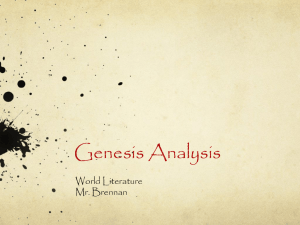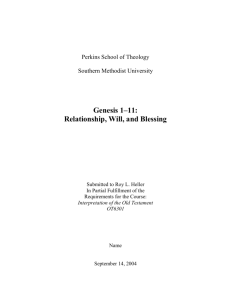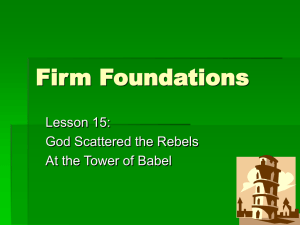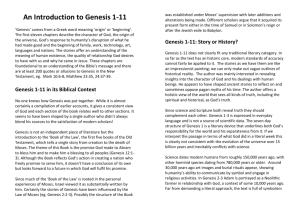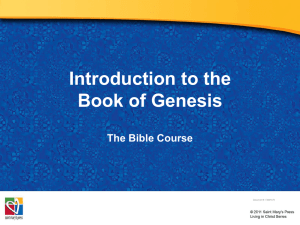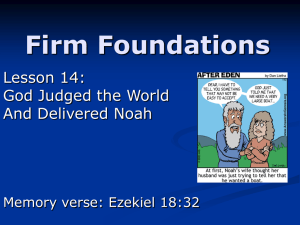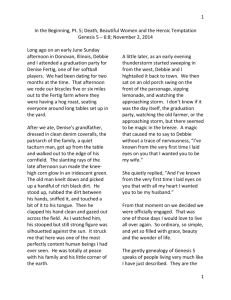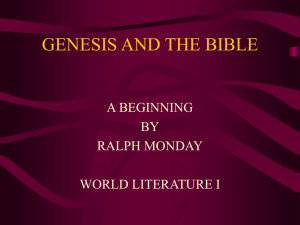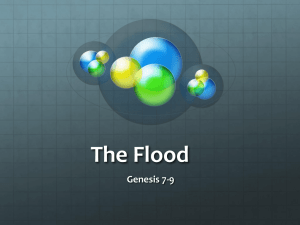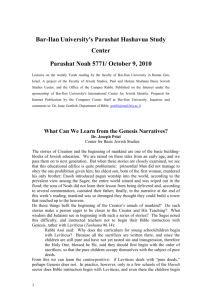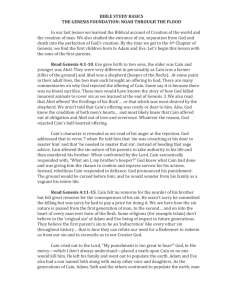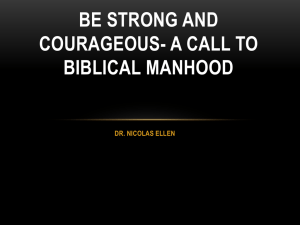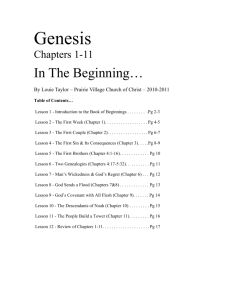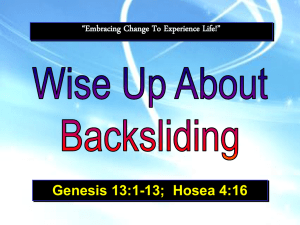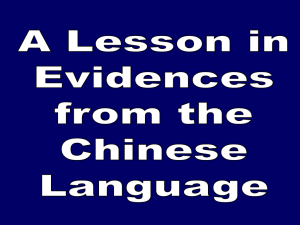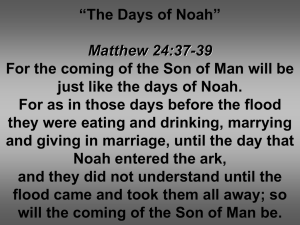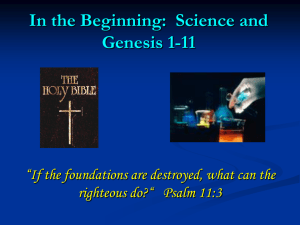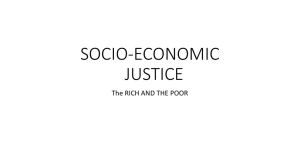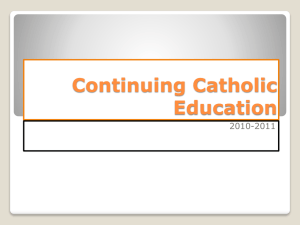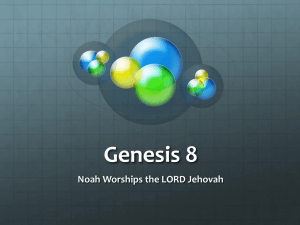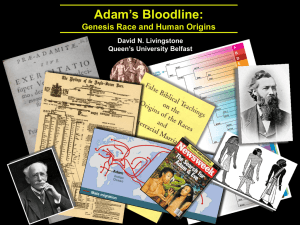September 24, 2014 - Power Point Presentation
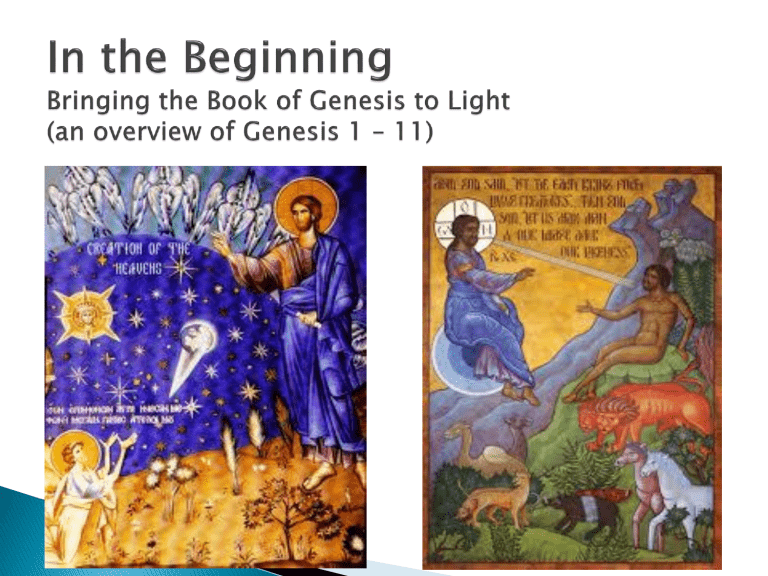
Genesis as an Introduction to the Bible
Creation Narratives and The Fall
◦ Notice the Plural—narratives
Adam’s Family (not the Addams Family)
Noah and the Flood
The Tower of Babel
Not the first book of the Bible by accident
◦ Introduces biblical vocabulary and overarching themes
◦ Sets the stage for the full purview of the Bible
Genesis 1-11 deals with all people, not just Jews/Israel
God dealt with all people; all people turned away from Him; thus, all people are in need of redemption
“In the Beginning…” ( ἐ ν ἀ ρχ ῇ )
◦ ἀ ρχ ῇ (“arch”) means first as in basis, not in chronological time necessarily first
◦ Shows the story in Genesis is not necessarily to be viewed as a scientific/historical text, but as a basis to understand/interpret life
Often juxtaposed to the general Babylonian understanding
Two Accounts of Creation
◦ Genesis 1:1 – Genesis 2:3
◦ Genesis 2:4 – end of Genesis 2
◦ Genesis as compilation of earlier, separate sources
Differing, Irreconcilable (from literal perspective) Accounts
◦ First account is the one with which we are most familiar and is most often cited by “literalists”
◦ Second account is the famous “Fall of Mankind”
◦ Notable differences, most especially the order of creation (man first vs. man last; Elohim vs. Yahweh )
Creation of Heavens and Earth
◦ Earth was tohu wa vohu
◦ Nothing was functional
(without form and void)
◦ Notice God does not explicitly create two of the human/biblical enemies: darkness and water
Creation of Light
◦ God immediately begins conquering human enemies
◦ Light named first; given priority
◦ “One day,” not “the first day”: definitive of a day
◦ Evening first, then morning
Liturgical tradition
Death, then Resurrection
◦ Notice no sun yet even though there is light
Creation of Earth and Seas
◦ On third day God now conquers the second enemy: seas
◦ “Mother Earth” is put under God’s jurisdiction
◦ Notice, again, still no sun despite vegetation
Creation of “Two Great Lights”
◦ Sun and Moon not mentioned by name
Referred to as “larger lantern” and “smaller lantern”
Placed as essentially equal to the stars; placed after light and after vegetation
They were deities in Babylonian pantheon
Set in place by God like a star on top of a Christmas tree
Three times the passage mentions they are simply a reference, not deities
Creation of Animals
◦ Sea animals on 5 th day
◦ Land animals on 6 th day
They co-habit the earth with us
Blessed by God animals with humans, not separately like sea
◦ Blessing is clearly related to ability to produce offspring
Creation of Humanity
◦ In the image and after the likeness of God
In ancient Near East, Kings alone considered to be the image of God
Means we are to behave like God
Our task is to make God’s presence known in this world
◦ Given dominion over sea and land animals
Just as kings have dominion over a city
God is the model—i.e. stewardship not lordship
◦ “Male and female He created them”
Anti-individualism
Sabbath
Creation of Adam (i.e. “man”)
◦ Occurs at the beginning of this second story
◦ Only the male was made at the beginning
◦ Formed from dust, but given the breath of God
The Garden of Eden
◦ Planted by God and given to Adam
Consistent problem: humanity thinks it owns/controls what God gives as a gift
◦ First commandment issued by God
Not to eat of the tree of knowledge of good and evil
Shows primary problem with humanity is conceit
Death (i.e. shortened life) is punishment
Creation of Animals
◦ God formed them same as Adam, but without breathing His own breath into them
◦ God brought animals to Adam to name
◦ None was found as a comparable helper
Creation of Eve (i.e. “woman”)
◦ Eve was “built,” not “made”
◦ Adam presumptuously considers woman to be a product of him and not of God
◦ Adam unilaterally names Eve
◦ Interdependence of male/female
Woman tempted by serpent
Sin is two-fold
◦ Disobeying God’s commandment
◦ Attempting to be as knowledgeable as God
Problem happens after Adam eats
◦ He was the one to whom the command was given
God does not immediately cause death
◦ First act of God’s forgiveness
The primary punishment is by adding difficulty to the previous blessings
Eve said she “acquired” Cain
◦ Cain’s name comes from same root as property
Abel means “breath” or “vanity” (i.e. passing)
◦ Names are often functional in the Bible
Cain kills Abel
◦ Difference in offering (Abel offers “firstfruit”)
◦ God sets a mark on Cain so Cain will not be killed by others; vengeance belongs to God alone
Cain builds a city
◦ Contrary to God’s commandment to spread out on the earth
7 th Generation – Lamech introduced
◦ Seems to be a play on “king” ( malak )
◦ Lamech lives like kings (multiple wives, arrogant view of himself)
◦ Thus far, negative view of humanity; but a different option is now presented
Introduction of Seth
◦ Seth is Abel’s “replacement”
◦ His name means “appointed” or “posited”
◦ The geneaology continues through Seth
◦ Enosh, his son, means “human being”
◦ After Enosh “men began to call on the name of the
Lord” (Genesis 4:26); through him comes Noah
Immediately before Noah
◦ “Now it came to pass…that the sons of God saw the daughters of men, that they were beautiful; and they took wives for themselves of all whom they chose” (Genesis 6:1-2).
◦ “And the L
ORD said, ‘My Spirit shall not strive with man forever, for he is indeed flesh; yet his days shall be one hundred and twenty years.’ There were giants on the earth in those days” (Genesis 6:3-4).
◦ “Then the L ORD saw that the wickedness of man was great…and that every intent of the thoughts of his heart was only evil continually. And the L ORD was sorry that He had made man on the earth” (Genesis
6:5-6).
“But Noah found grace in the eyes of the
L ORD ” (Genesis 6:8).
◦ Introduction of one man as savior of all
And notice that at no time is that man YOU
◦ Noah is said to be “blameless” (legal terminology)
◦ Noah is said to be “culticly pure” (like the sacrificial lamb must be pure)
◦ Notice Noah has only one wife
Two accounts merged into one
◦ “P” or Priestly account
◦ “J” or Yahweh account
Priestly Account
◦ Refers to God as Elohim (more universal name)
◦ Merged accounts open and close with P account
◦ In these accounts, God commands and Noah does
Yahweh Account
◦ Refers to God as Yahweh (more restrictive name)
◦ References “clean” and “unclean” animals
Indicates notion that rituality pre-dates the text itself
Preview of God’s Final Judgment
◦ Nearly total destruction
◦ Both man and beast pay for humanity’s sin
The Flood is a passing event
◦ Contained within one person’s lifetime
◦ God’s punishment in this life is meant for instruction, not destruction
God’s Covenant
◦ One-way, unconditional covenant
Man has no control over the rainbow
◦ Made with all humanity, not specifically with Jews
“Baptism of the earth”
◦ Like a new creation
After the first year, during the first month, on the first day the earth was finally dry and habitable again
◦ New opportunity for humanity via the faith of Noah
Three Sons: Shem, Ham, Japheth
◦ Noah’s “family tree” is established in such a way in
Genesis 10 as to show the entire (known) inhabited world to be populated from Noah and his sons
◦ Indicates God’s concern is with all humanity, not only Abraham’s descendants, on whom the biblical story will begin focusing in Genesis 11 and 12
◦ The covenant made with Noah, and the blessing that comes through the faith of Noah, is open to all humanity
People of the earth are united in one language
They wish to “make a name” for themselves
Contrary to God’s command, they do not want to be scattered
Like Adam, who wanted to have knowledge like
God, they tried to “reach to the heavens”
The text, like the rest of the Bible, is antiimperialistic
Babel is likely a reference to or play on the
Babylonian Empire
Their punishment is to be scattered and for the language to be confused
Genesis itself serves as an intro to the Bible
The (hi)story of Israel is told within the purview of all creation/all humanity
The stories are meant to inform our views of our relationship with God and each other
Humanity’s primary job is to represent God
God is shown as supreme; humanity constantly turns from His ways; humanity in need of redemption
God does not like human selfish ambition
(buildings, acquisitions)
God wants us to
behave
not want us to try to like Him, but does
be
Him
◦ We should not attempt to usurp God’s position
The way to God is through faith and trusting in His appointments
